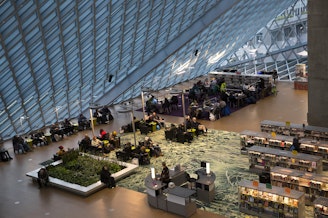Battery farms to store green energy are needed, but where should they go? King County considers

Solar panels and wind turbines don't generate power 100% of the time, so large battery energy storage systems help even out the power. Now, the King County Council is deciding where, and under what conditions, those battery systems should be allowed.
The King County Council wants to regulate battery energy storage systems.
Councilmember Sarah Perry has been bringing together stakeholders to hammer out a bill that encourages the technology, while responding to local concerns about where to allow the storage systems.
RELATED: Washington vs China. Why the NW could have the next generation of battery tech
M
ost battery energy storage systems are large lots covered with shipping containers full of batteries. They're not pretty to look at, but officials say they form an important part of the energy grid of the future.
After the first generation of battery facilities were built around the world, a few of them caught fire. Most of those fires were in South Korea.
Another deadly fire broke out at a battery factory in South Korea this June, where tightly stacked battery cells appeared, in a video, to spontaneously combust.
Those early stories led the people who lived next to proposed projects to strongly oppose them, including neighbors to a proposed storage system in Covington, Washington in 2023, being developed by a Nebraska-based company called Tenaska.
The Covington project was eventually rejected for unrelated reasons.
Since that first generation of battery facilities, there's been more research on their safety, and rules around how to build them and how to arrange them in storage facilities have tightened up.
RELATED: Northwest companies charge toward battery tech revolution
"All of the issues that led to that concern at that time have since been addressed through the international fire code and state legislation," Perry said.

But with safety addressed, there's still the question of where to allow them.
J
essi Bloom is from the county agricultural commission. She spoke at a recent public hearing at the County Council.
“Farmers are already getting offers from predatory utility companies, and if the price is high enough, it will be very hard to say no," Bloom said. "So we could lose a lot of farmland, which we need to protect.”
King County is only 3% farmland, and battery projects go against efforts to keep food local and attract a new generation of farmers, Bloom said.
RELATED: The race is on to build EV battery-recycling plants in the U.S.
Another concern is how to make energy companies that build these facilities accountable for the costs of decommissioning them when they're no longer needed.
Councilmember Perry said to protect taxpayers, energy companies would need to bring money, perhaps in the form of a bond or something else. She says money is better than mere assurances, since companies can sometimes escape financial responsibilities when costs like that come due by dissolving or declaring bankruptcy.
Perry says the current legislation, recently passed in the land use committee, will require amendments to hammer out detailed responses to the farmland and decommissioning cost concerns. But overall, she said she's excited to see battery projects move forward, where possible.
She said King County's legislation will likely become a model for other counties as the technology becomes more common.
Amendments to the bill are due by Aug. 16. Perry said the legislation will then come before the full county council on Sept. 24.
UPDATE 7/20 10:43AM: Additional information and links related to the South Korean battery factory fire added.




